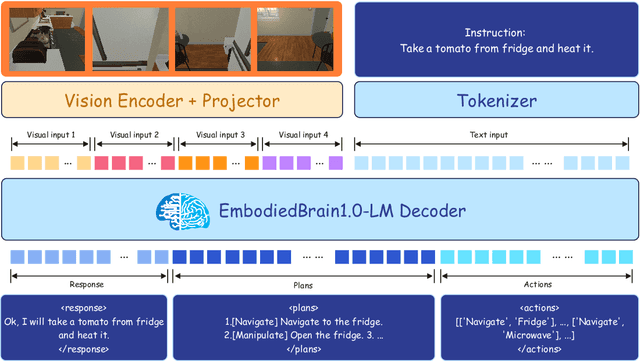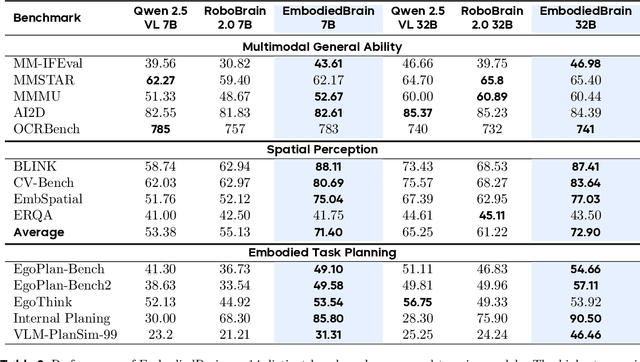Zhengwei Gao
EmbodiedBrain: Expanding Performance Boundaries of Task Planning for Embodied Intelligence
Oct 23, 2025



Abstract:The realization of Artificial General Intelligence (AGI) necessitates Embodied AI agents capable of robust spatial perception, effective task planning, and adaptive execution in physical environments. However, current large language models (LLMs) and multimodal LLMs (MLLMs) for embodied tasks suffer from key limitations, including a significant gap between model design and agent requirements, an unavoidable trade-off between real-time latency and performance, and the use of unauthentic, offline evaluation metrics. To address these challenges, we propose EmbodiedBrain, a novel vision-language foundation model available in both 7B and 32B parameter sizes. Our framework features an agent-aligned data structure and employs a powerful training methodology that integrates large-scale Supervised Fine-Tuning (SFT) with Step-Augumented Group Relative Policy Optimization (Step-GRPO), which boosts long-horizon task success by integrating preceding steps as Guided Precursors. Furthermore, we incorporate a comprehensive reward system, including a Generative Reward Model (GRM) accelerated at the infrastructure level, to improve training efficiency. For enable thorough validation, we establish a three-part evaluation system encompassing General, Planning, and End-to-End Simulation Benchmarks, highlighted by the proposal and open-sourcing of a novel, challenging simulation environment. Experimental results demonstrate that EmbodiedBrain achieves superior performance across all metrics, establishing a new state-of-the-art for embodied foundation models. Towards paving the way for the next generation of generalist embodied agents, we open-source all of our data, model weight, and evaluating methods, which are available at https://zterobot.github.io/EmbodiedBrain.github.io.
KAN-AD: Time Series Anomaly Detection with Kolmogorov-Arnold Networks
Nov 01, 2024



Abstract:Time series anomaly detection (TSAD) has become an essential component of large-scale cloud services and web systems because it can promptly identify anomalies, providing early warnings to prevent greater losses. Deep learning-based forecasting methods have become very popular in TSAD due to their powerful learning capabilities. However, accurate predictions don't necessarily lead to better anomaly detection. Due to the common occurrence of noise, i.e., local peaks and drops in time series, existing black-box learning methods can easily learn these unintended patterns, significantly affecting anomaly detection performance. Kolmogorov-Arnold Networks (KAN) offers a potential solution by decomposing complex temporal sequences into a combination of multiple univariate functions, making the training process more controllable. However, KAN optimizes univariate functions using spline functions, which are also susceptible to the influence of local anomalies. To address this issue, we present KAN-AD, which leverages the Fourier series to emphasize global temporal patterns, thereby mitigating the influence of local peaks and drops. KAN-AD improves both effectiveness and efficiency by transforming the existing black-box learning approach into learning the weights preceding univariate functions. Experimental results show that, compared to the current state-of-the-art, we achieved an accuracy increase of 15% while boosting inference speed by 55 times.
 Add to Chrome
Add to Chrome Add to Firefox
Add to Firefox Add to Edge
Add to Edge